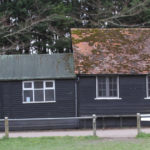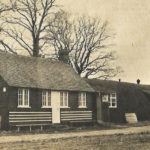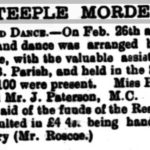Reading Room
The Reading Room is on the Recreation Ground. It is timber built, with red tile roof and brick-built chimney on the end, serving an open fire. It was constructed in the latter part of 1912 to mark the Coronation of George V, which had taken place in the previous year. Initiated by the Coronation Celebration Committee, it was funded by public subscription and subsequently was run by a Management Committee made up of Parish Councillors and parishioners. Eventually, responsibility devolved to the Parish Council and the Room has been used more recently as a sport pavilion (football changing room) and general meeting room. It is not recorded when it ceased being a Reading Room in its original sense.
The origin of Reading Rooms generally can be traced back to the 1830s, although it was not until later in the 19th Century that they became a common phenomenon and continued into the early 20th Century. Viewed as an alternative to the public house as a comfortable evening social venue for the men of the parish, the Rooms offered educational self-help, with newspapers and books, as well as card games and billiards and the like. Drinks were available, although strictly no alcohol. In the early 1900s there was an active campaign to reduce the number of beerhouses, with the Licensing Justices revoking selected licenses. The provision of a parish Reading Room was another aspect of a broad attempt at social engineering, with the Room promoting literacy and informed opinion, whilst reducing drunkenness and wasteful expenditure on drink.
Parish Council Involvement
These extracts from the Parish Council Minutes up to 1917 provide some insight as to the origin and development of the Reading Room
Meeting of Parish Council held 4th September 1912
Coronation Memorial – a letter was read from the secretary of the Coronation Celebration Committee stating that the committee proposed to erect a reading & recreation room in celebration of the event & asking for the consent of the council to erect the room on the recreation ground & to undertake the trust thereof. The Chairman proposed & Councillor Pepper seconded that permission be given to the committee to erect a reading room on the recreation ground, which was carried unanimously.
Meeting of Parish Council held 28th November 1912
Reading Room – In the matter of the management of the reading room after some discussion councillor Broad proposed that a reading room committee be appointed consisting of four members of the council with one [the?] chairman the said committee to have power to co-opt four persons outside the council, councillor Parrish seconded & the resolution was carried unanimously. Councillor Jarman proposed that the reading room committee be Councillors the Rev. E Y Orlebar, Broad, Parrish & Pepper, seconded by the vice-chairman and carried nem con.
Meeting of the Parish Council held 20th February 1913
Reading Room – a letter was read from the secretary of the reading room committee requesting that a path be constructed by the council from the road to the room & councillor Orlebar moved that a half-penny rate be levied as a contribution towards making a gravel path as requested councillor Broad seconded.
Councillor Fordham moved as an amendment that the matter be dropped, councillor Frohock seconded and the amendment being put to the meeting was carried by three votes – those voting for being the vice-chairman & councillors Fordham, Frohock, Jarman & Pepper. Councillors Orlebar & Broad voting against & the council proceeded to the next business.
Reading Room Life
Further insight into the operation and usage of the Reading Room is provided by this newspaper report of 1914
Village Institute Language
General Allegations of Bad Language by Members
During the hearing of a summons at Arrington Petty Sessions on Monday, it was alleged by the defendant that nearly every user of the Reading Room at Steeple Morden was in the habit of using bad language.
Frank Kirbyshire (32), labourer, of Steeple Morden, was summoned for using insulting language towards William Chance, in the Reading Room, on November 10th, 1914. – He pleaded not guilty.
William Chance said he lived at Steeple Morden, and was caretaker of the Reading Room. On November 1oth at about 9 p.m. defendant was playing billiards with another member, and because he was losing began to use bad language. Witness remonstrated with him, and he then used very bad language towards witness, and threatened to give him a good hiding if he would go outside. Defendant then went out. There were 15 or 16 other members in the room at the same time.
Defendant: What conditions were we playing on?
Witness: I don’t know
We were playing losers pay, weren’t [sic] we? – I don’t know.
I ordered some coca and had to wait 40 minutes for it? – No, you didn’t.
Do you not swear in the room? – Certainly not.
Defendant: Yes, you do. There is not a man who uses the room who does not.
Wesley Jarman (subpoenaed) said he was a member of the Reading Room and was present on the evening in question. He was playing billiards when he heard the defendant swearing, but he did not who at. He did not take much notice of it.
Defendant said that the rules of the club were that no one should swear, but nearly all the members did. On the night in question there was a general disturbance, and several members left the room then and had not been there since. He admitted swearing at complainant, but he swore back. He thought complainant was as bad as he was.
In answer to an inquiry from the Chairman, Supt. Salmon said defendant had been before the Bench four times before, the last time in August, 1911.
The Chairman said they found defendant guilty. He would be fined 10s., including costs, and would be bound over to keep the peace towards William Chance for six months in the sum of £5.
Defendant signified his willingness to be bound over and paid the fine.
Report in Cambridge Independent Press 11 December 1914
Click on any image below to view. Click again to enlarge. Drag to view entire image.
Photographs, Maps & Newspaper Reports
Last Updated on November 7, 2025



